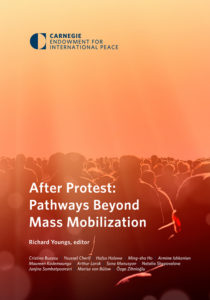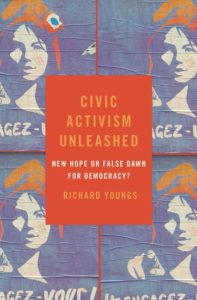 When historians look back at 2019, the story of the year will be the tsunami of protests that swept across six continents and engulfed both liberal democracies and ruthless autocracies, The New Yorker’s Robin Wright contends:
When historians look back at 2019, the story of the year will be the tsunami of protests that swept across six continents and engulfed both liberal democracies and ruthless autocracies, The New Yorker’s Robin Wright contends:
Popular protests have long been part of the human story in the modern era ….The difference today, [Harvard’s Erica] Chenoweth said, is that in 1968 there was still a widespread belief that real power flowed from the barrel of a gun. “In our time, that belief is crumbling. There is a falling away from the consensus that you need armed struggle” to change political systems, and an increasing sense that violent protest leads to a disproportionate loss of life. “People are not picking up guns as they did in earlier eras. They’re instead looking to civil resistance to assert their claims and seek transformation,” she said. “It’s what binds the different movements of our time.”
The breadth and durability of Hong Kong’s pro-democracy protests against the world’s most powerful authoritarian government in China are remarkable. Yet the status quo doesn’t feel sustainable, The Wall Street Journal’s Gerald F. Seib writes.
More than six thousand police officers will be deployed (SCMP – HT:CFR) in anticipation of protests planned for New Year’s Day, officials said. Hong Kong’s police commissioner has vowed to take swift measures against any violence by demonstrators.
On New Year’s Day, authorities have approved a pro-democracy march from Causeway Bay to Hong Kong’s central business district organized by the Civil Human Rights Front—the group that held the city’s biggest marches in June, Reuters adds. This month, they organized a mass protest after the municipal elections that drew an estimated 800,000 people. The march will mark nearly seven months of anti-government protests in Hong Kong.
CFR’s James M. Lindsay writes that Hong Kong’s protests were among the most significant world events of 2019.
 In a new book, “Crucible: The Long End of the Great War and the Birth of a New World, 1917-24,” historian Charles Emmerson suggests that countries lose all their moorings during periods of unrest and the result is just chaos, VOA reports:
In a new book, “Crucible: The Long End of the Great War and the Birth of a New World, 1917-24,” historian Charles Emmerson suggests that countries lose all their moorings during periods of unrest and the result is just chaos, VOA reports:
In the immediate postwar years that Emmerson chronicles, many people felt powerless, lost faith in the ability of traditional political authorities to protect them and to restore predictability, and resented unequal distributions of wealth and power. So, too, now.
“The established order is swept away,” writes Emmerson. “People who were nothing are catapulted into prominence … the real becomes surreal.”
This decade brought us revolutions, crises and strong backlashes too. And even though it is easy for authoritarians to prey on societies in turmoil, the popular demand for equality and a liveable future do not dissolve, even under tyranny, adds Eurozine, a partner of the National Endowment for Democracy. It provides a list of articles on the most crucial events of each year: a brief takeaway from the momentous 2010s.
From protest to politics?
Protest movements will almost certainly be a feature of 2020 as well, Wright adds:
 “Protests are becoming part of ordinary political engagement,” Richard Youngs, a democracy expert at the Carnegie Endowment for International Peace and the author of “Civic Activism Unleashed: New Hope or False Dawn for Democracy?,” told me. “The range of protests is quite staggering if you think about what’s happening across Latin America, in several African countries, in Eastern Europe, in both poor and wealthy Asian nations and even in the most difficult of circumstances in Russia. It’s remarkable. There’s not a political model that seems to be doing well or that is inoculated from the kind of uprisings the world is witnessing.” RTWT
“Protests are becoming part of ordinary political engagement,” Richard Youngs, a democracy expert at the Carnegie Endowment for International Peace and the author of “Civic Activism Unleashed: New Hope or False Dawn for Democracy?,” told me. “The range of protests is quite staggering if you think about what’s happening across Latin America, in several African countries, in Eastern Europe, in both poor and wealthy Asian nations and even in the most difficult of circumstances in Russia. It’s remarkable. There’s not a political model that seems to be doing well or that is inoculated from the kind of uprisings the world is witnessing.” RTWT
After protest peaks, protestors need to build a wider set of alliances within their own countries since they can find themselves somewhat isolated from other sectors which are also ostensibly in favour of change, Youngs adds, in After Protest: Pathways Beyond Mass Mobilization. This often means they need to develop some kind of relationship with mainstream politics. While in most cases protestors struggle with this challenge, there are examples like Taiwan’s Sunflower movement where the move from protest to politics has been more successful.







